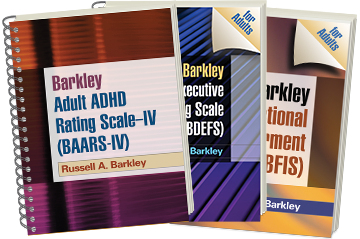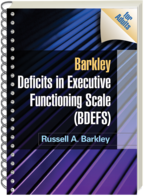Barkley Deficits in Executive Functioning Scale (BDEFS for Adults)
Russell A. Barkley
A Paperback Original
A Paperback Original
orderFebruary 1, 2011
ISBN 9781606239346
Price: $195.00 174 Pages
Size: 8" x 10½"
Convenient Wire Binding
Check out a special package offer including this title!

See related items for this product
Read a Q&A with featured author, Russell A. Barkley!
Sign up for emails on upcoming titles by Russell A. Barkley (with special discounts)!
Sign up for emails on upcoming titles by Russell A. Barkley (with special discounts)!
“Reliable, empirically based, and convenient to use for clinicians. Allow[s] a doctor to quantify behaviors that can't be readily observed in the clinic.”

—ADDitude Magazine
“The BDEFS is a much-needed, clinically relevant tool. This exceptionally well-written manual includes a detailed description of the scale's development, psychometric properties and norms, scoring, and clinical interpretation, as well as the forms themselves. The limited photocopy license clearly enhances the clinical utility of the BDEFS. All professionals responsible for assessing and understanding adults suffering the burden of executive dysfunction will find this scale highly useful and beneficial.”

—Rosemary Tannock, PhD, Department of Human Development and Applied Psychology, Ontario Institute for Studies in Education; Department of Medicine, University of Toronto; and Hospital for Sick Children, Toronto, Canada
“Barkley has created a rating scale that is quick and easy to administer and score. The BDEFS provides valuable information regarding specific executive functioning deficits, including those found in ADHD. This scale does what a good assessment instrument should: not only does it answer questions regarding diagnosis, but it also helps clinicians identify target skills and behaviors for intervention.”

—Peg Dawson, EdD, Center for Learning and Attention Disorders, Portsmouth, New Hampshire
“The BDEFS ushers in an era of more specific and comprehensive behavioral assessment of executive functioning difficulties encountered by adults during major functional activities. The scales are well designed to be both clinician and patient friendly. The content is broader than other available scales and the normative observations are carefully derived and extensive. Behavioral items are focused around common daily activities rather than clinical symptoms, and thus can be applied in a variety of settings. The combination of self- and other-report forms, as well as long and short forms, provides depth and flexibility. This scale is a powerful complement to traditional executive function tests.”

—Paul J. Eslinger, PhD, Professor of Neurology, Neural and Behavioral Sciences, and Radiology, Penn State Hershey Medical Center and College of Medicine
—ADDitude Magazine
“The BDEFS is a much-needed, clinically relevant tool. This exceptionally well-written manual includes a detailed description of the scale's development, psychometric properties and norms, scoring, and clinical interpretation, as well as the forms themselves. The limited photocopy license clearly enhances the clinical utility of the BDEFS. All professionals responsible for assessing and understanding adults suffering the burden of executive dysfunction will find this scale highly useful and beneficial.”
—Rosemary Tannock, PhD, Department of Human Development and Applied Psychology, Ontario Institute for Studies in Education; Department of Medicine, University of Toronto; and Hospital for Sick Children, Toronto, Canada
“Barkley has created a rating scale that is quick and easy to administer and score. The BDEFS provides valuable information regarding specific executive functioning deficits, including those found in ADHD. This scale does what a good assessment instrument should: not only does it answer questions regarding diagnosis, but it also helps clinicians identify target skills and behaviors for intervention.”
—Peg Dawson, EdD, Center for Learning and Attention Disorders, Portsmouth, New Hampshire
“The BDEFS ushers in an era of more specific and comprehensive behavioral assessment of executive functioning difficulties encountered by adults during major functional activities. The scales are well designed to be both clinician and patient friendly. The content is broader than other available scales and the normative observations are carefully derived and extensive. Behavioral items are focused around common daily activities rather than clinical symptoms, and thus can be applied in a variety of settings. The combination of self- and other-report forms, as well as long and short forms, provides depth and flexibility. This scale is a powerful complement to traditional executive function tests.”
—Paul J. Eslinger, PhD, Professor of Neurology, Neural and Behavioral Sciences, and Radiology, Penn State Hershey Medical Center and College of Medicine



